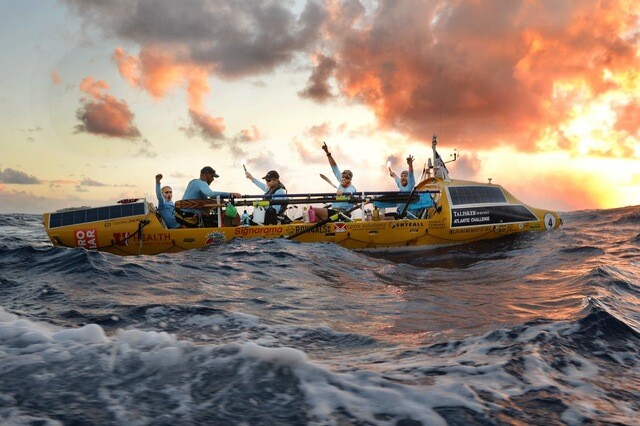In December 2018, Alan Alderman could see nothing ahead except expansive, endless water. More than 2,000 miles from his destination, a seasick Alderman steered a 28-foot-long boat crammed with five men. While Alderman had initially compared his epic journey across an ocean to those of scriptural giants like Nephi, Noah, and the Jaredites, at that moment Alderman felt more like Laman or Lemuel.
What had possessed him to leave his family and the comforts of his home during Christmas to row across the Atlantic Ocean?
“We wondered what in the heck we had gotten ourselves into,” Alderman says. “We all blamed Tim Ryan, our team captain who had this brilliant idea. . . . I relate it to how Laman and Lemuel must have felt when they were out on the sea and they were mad at their dad and at Nephi and they tied them up and wanted to throw them overboard, because there was a moment in time I wanted to throw Tim right overboard.”
So how did Alderman find himself in such a miserable condition? What possessed five men to cross an entire ocean with nothing but a boat, oars, and their own will power?
Genesis
Tim Ryan stepped out into a dark, snow-strewn night in February 2017, an exciting and crazy idea forming in his mind. He was going to row across the Atlantic Ocean.
More people have been into outer space and climbed Mount Everest than have rowed across the Atlantic. Yet Ryan knew it was possible. He had just stepped out of a documentary detailing how four middle-aged English women who met in the carpool lane at their kids’ schools ended up rowing across the Atlantic together.
“From that moment, I knew I would compete in [the Atlantic Challenge],” Ryan says.
All Ryan needed was a boat, a team, and a cause that would inspire five men to row more than 3,000 miles nonstop through heat, waves, and whatever fury Mother Nature might throw at them.
He instantly knew the man he needed to call: Alan Alderman.
“I’ve known Alan since around 2000,” Ryan says. “Ours is an unlikely friendship, what with a Latter-day Saint and a guy who owns 12 sports bars. . . . Yet, we have a super strong bond. There isn’t anything I wouldn’t do for him, and I gather he would do the same for me.”
When Alderman was diagnosed with ALS in 2001, Ryan became “one of my biggest supporters,” Alderman says.
So when Ryan was searching for a charitable cause to raise awareness for during the Atlantic Challenge, Alderman instantly came to mind.
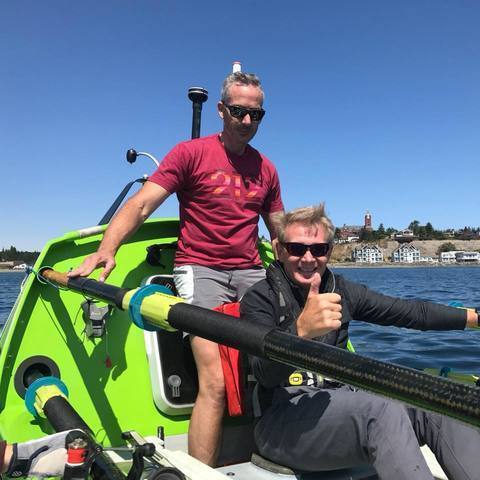
“Tim contacted me hoping that I would help him with the fundraising and the charitable component of the race,” Alderman says. “I said, ‘I believe that it is a fantastic fundraising idea, and yes, I will help you. But my help comes under one condition: I am on that boat and I am a part of the team.”
“He swallowed hard and probably thought, ‘Oh no, what have I done?’ Alderman continues. “And that is how Row4ALS was formed.”
The Race Begins
On December 12, 2018, Row4ALS was the first team out of the harbor as they began their two-month trek from La Gomera in the Canary Islands to Antigua. “We were nervous and apprehensive because we were leaning into the unknown,” Alderman says. And the crew had good reason for their pre-race butterflies.
Just three days before the race, the crew endured a horrific three-hour practice row. Despite taking Dramamine and sporting an anti-seasickness patch, Alderman became violently ill. That night, he told his team that he would withdraw from the race if he became that sick again on the next practice row.
“The silence at that moment was amazing,” Alderman says. Though it would be heartbreaking to withdraw, Alderman knew the ramifications if he became ill during the long-distance race. If, at any point in the race, he or his crew required medical or other assistance, they would be disqualified.
Thankfully, Alderman didn’t have even a hint of seasickness during the next practice row.
The team set out from La Gomera in a 28-foot long, 70-inch wide highly specialized carbon fiber boat. “These boats are virtually unsinkable,” Alderman says, adding with a laugh that he knows that’s what they said about the Titanic before it sank on its maiden voyage.
With Alderman was Tim Ryan, Ted Waldo, Dale Smith, and Brian Armstrong, with Steve Sawaya acting as the team’s land support and technical manager.
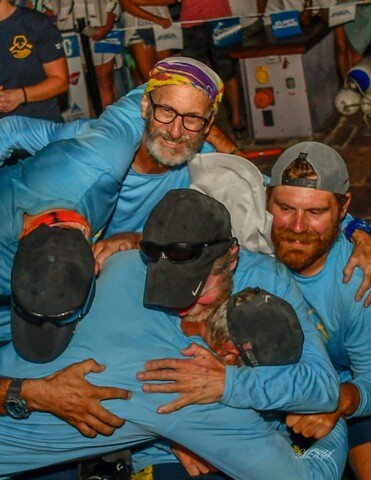
“The conditions of life on a rowboat have really forced all of us through some, shall we say social barriers or norms. There’s no personal space. It’s a big change to be helping your buddy off a toilet bucket or tracking his urine production,” Alderman says. “But isn’t that the basis of being stripped down to raw survival? Unbreakable bonds are being formed.”
About the journey, Alderman succinctly summed up the life-changing trip in 11 words: “From there, we just rowed and rowed and rowed and rowed.”
Despite the months of physical preparation, there was no way the men could prepare mentally for the monotony and strain of the journey. Four out of the five rowers, including Alderman, had bouts of seasickness throughout the two months at sea, leaving them miserable and weak.
“Rarely were you able to sleep for more than an hour to an hour-and-a-half at a time,” Alderman says. “You were constantly wet with saltwater. I don’t think that my feet were dry for the whole time.” The men also began developing blisters and sores along their hands, backs, butts, and legs.
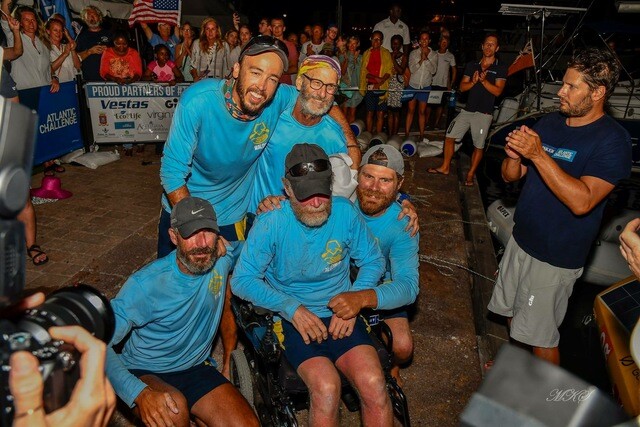
The freeze-dried food aboard the boat, in Alderman’s opinion, was disgusting. Every night the men would scrounge up what food they could palate and then play the game “What’s for Dinner?” by describing in meticulous detail what they would have eaten for dinner on dry land.
An eerie moment came for the crew on the morning they awoke to find the last island had passed out of sight and nothing but water surrounded them. The five men would not see land for another 49 days.
“We had anticipated and trained very well for the physical part of the row, but as hard as it was physically, it was a lot harder mentally, emotionally, and psychologically,” Alderman says. “The race is obviously physical . . . but it is more in your head and in your heart than it is in your arms.”
Despite the trepidation and discomfort, Alderman knew from past experience that he could survive and even find happiness in the most miserable of circumstances.
A Life-Changing Diagnosis
In 2001, Alan Alderman began noticing a few unusual symptoms. “I started noticing that I was having trouble speaking. My voice was a lot more monotone. I was slurring some words,” Alderman says. “Also, I started having trouble swallowing.”
Alderman tried to shrug off the symptoms for six months, until he finally realized he needed to see his doctor. That one checkup led to dozens of visits with pulmonologists, speech therapists, neurologists, and other specialists over a three-month period.
“It all culminated on one fall afternoon in late September when, after running a few tests, the doctor . . . sat down on the little round stool that they have in their examination rooms, pulled right in front of me, put his hands right on my knees, and said, ‘Alan, I believe that you have ALS.’ . . . When he said [those] words, that changed everything,” Alderman says.
At that moment, the 40-year-old father of three was told he had only two to five years left to live.
“I was in a career that I loved. My wife at the time and I had just bought a brand-new home in South Jordan [Utah] and moved our family from Southern California. My kids were young; they were 9, 8, and 5 at the time. And everything seemed to be going great,” Alderman says. “Here this guy was telling me that I had a disease that was going to rob me of my ability to move, eventually kill me, and that there was nothing that he or any other doctor could do for me. My whole world turned upside down in that one moment.”
For weeks, Alderman wrestled with the diagnosis, his faith, and his Heavenly Father. “I was angry. I was discouraged. I felt hopeless. I felt helpless,” Alderman says. “For months after my diagnosis, I remember pleading with my Father in Heaven, ‘Don't let this be ALS. Let it be something else. Let it be something that they can give me a shot for or a pill.’”
Alderman now recognizes this struggle as an experience shared by humanity—the pleading and seeking to know why, the shrinking from the road ahead. “Even our Savior—the only perfect being who has ever walked the earth, the literal Son of our Father in Heaven—even He was overwhelmed with the physical and emotional challenges. What did He say in Gethsemane? ‘Father remove this cup. Nevertheless thy will be done,’” Alderman says. “I am not comparing myself to my Savior in any stretch of the imagination, but I have said those words plenty of times over the years.”
And through his pleading, praying, and faith, Alderman has come to know that the Lord can bring light and hope even into our darkest challenges: “I was in a dark spot for a while. But then I decided, ‘Alan, it is what it is and you have a choice to make. ALS will probably take your life, but whether or not it destroys your life is up to you.’ I decided it would not destroy my life.”
Defying the Odds
Alderman’s doctor’s prognosis was wrong. Eighteen years later, Alderman is still living a life filled with challenges, the grace of God, and beauty that he could have never imagined before.
“I have this very rare form of ALS, and it is slow-progressing,” Alderman says. “No one in the medical or scientific field can tell you why I am alive right now. But to me, the only reason is that my Father in Heaven still needs me here and there is still some work for me to do.”
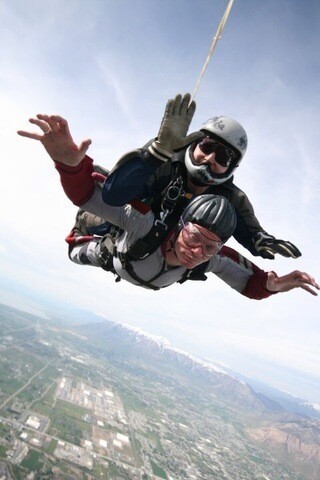
In addition to traveling the world raising funds for ALS, Alderman spends his time mentoring and supporting others who have been recently diagnosed with the disease.
“Every day is a gift, and the sooner that we realize that, the better off we will be,” Alderman says. “If everyone in this world lived their life like they had a terminal illness, then this world would be a lot better place. The reality is, we all have a terminal illness, and that terminal illness is called life. . . . When you live with [a terminal illness staring you in the face] every day, I think that you realize what is most important in life and you put more emphasis on that.”
Before being diagnosed with ALS, Alderman had three pillars that sustained him: faith, family, and friends. Now, he has added a fourth “f” to his list: Finding a cure for ALS.
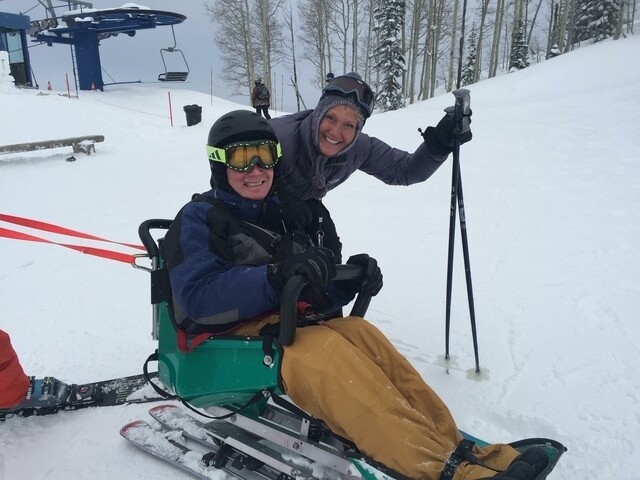
To the families he mentors, Alderman tells them, “ALS is not the end, there are many wonderful experiences in store for them if they will just choose to see them. . . . There's more to life than just living—it's living well, it's helping others, leaving your mark in a positive way whether that mark is just a pin dot on a piece of paper or as big as the whole world. . . . All that you can do is all that you can do, but all you can do is enough—that's the gospel according to Alan.”
This same fortitude, resilience, and optimism is what helped Alderman and his teammates across an ocean.
Finding Joy in the Journey
During those first few weeks on the open ocean, high winds and high seas created 25 to 30-foot waves that would occasionally crash across the boat. Sometimes waves flowing perpendicular to each other would meet near the boat so that when Alderman looked up all he could see was an impenetrable wall of water towering above him. “It is a little terrifying or nerve-wracking in the beginning,” Alderman says. But, with his characteristic optimism, he adds, “One of my favorite things was to feel the boat surfing down the front of that wave and then to also feel the rush when you drop down the back side of the wave. Really fun—better than any rollercoaster that I have been on.”
To help pass the time, the crew often played music, and Alderman loved listening to John Bytheway and other faith-promoting material.
“I was the only LDS person on the boat, so my teammates did not always enjoy listening to them,” Alderman says, noting how he still gets teased about his audio choices. “But they got a little bit of religion, whether they wanted to or not.”
Radioing other boats as well as calling friends and family over the satellite phone once a week and on Christmas also helped break up the monotony. But the best entertainment on the open ocean was nature.
One night the crew caught a mahi-mahi fish that made a delicious feast. Dolphins, sea turtles, and whales breeched near the boat, luminous rainbows stretched above the boat every day, and Alderman says “we always had at least one bird flying above the boat. We started seeing that bird as our guardian angel.” The crew named the bird Jack after Captain Jack Sparrow.
“The nights on the ocean were very, very lonely,” Alderman says. “My favorite part of every day was sunrise. It made me think about how sometimes in life we have those proverbial nights when times are hard and we think that the sun will never come up, but it always does. And when the sun rises, it’s a beautiful new day and a new opportunity to live life and learn and have fun.”
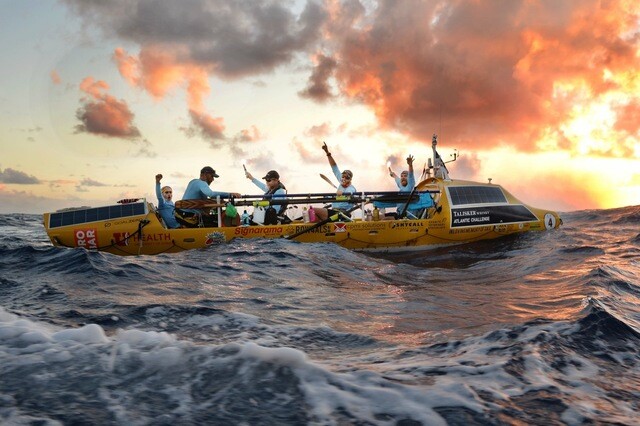
Alderman is all too familiar with those proverbial nights in his life.
Overcoming Despair
Alderman understands poignantly that living the gospel doesn’t mean we won’t experience mental, physical, and emotional pain. “Even having the most solid testimony of the gospel does not alleviate the physical pain, does not alleviate the emotional pain of life. But it will help us understand it, and it will help you to better navigate those things,” he says.
In 2009, eight years after being diagnosed with ALS, Alderman experienced a family change that made ALS seem like “a walk in the park compared to the heartache that I felt then,” Alderman says.
At moments, Alderman wished his ALS had progressed at a normal pace—that way he would not need to be alive to experience this new, bone-deep suffering.
“I spent a year and a half in therapy. I spent countless hours on my knees,” he says. Anger and bitterness came back into his life. But then he shares, “After months of pouring my heart out to my Father in Heaven, finally some peace came.” Alderman described a night when he was on his knees sobbing and pleading to God, and he received a call from his daughter, whose room was directly beneath his.
“Dad, are you okay?” she asked.
“I said, ‘I am good. My Father in Heaven and I are just having a little bit of a heart-to-heart,” Alderman remembers. “Thanks for worrying about me. I love you. Goodnight.”
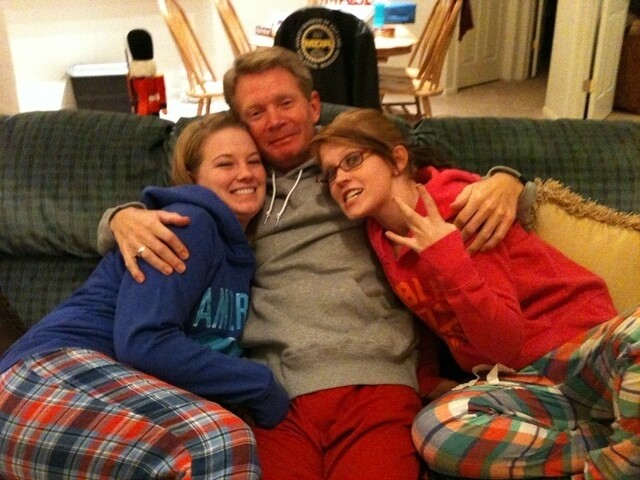
It was moments like these that sustained Alderman. At first the peace he felt came in fitful bursts or at unpredictable moments. But gradually, the peace lengthened until it began to fill his whole life.
“I don't know if you have ever had one [of those heart-to-hearts with God],” Alderman says. “One part of me says I hope not and then the other part of me says they are so good that I hope that you have, but when you are on your knees, pouring out your heart, sobbing to a loving Father in Heaven, and after you are there for a while, the peace and calm comes.”
He continues, “One day, with all that I was doing to try to heal, the Atonement took over and that peace and that calm stayed. . . . I learned then that the Atonement is a wonderful and almost incomprehensible thing for us as humans to understand.”
Finishing the Race
On February 1, 2019, the Row4ALS crew spotted land on the horizon. “That was exhilarating and exciting, but also a little bit trepidatious or fearful,” Alderman says. “We did not want it to end. I relate the whole experience to serving on my mission. Early on, you wonder what you are doing out there and you sometimes wonder why you came and you want it to be over. But then when the end of your mission is in sight, you don’t want it to ever end. You are a little nervous about what coming home will bring.”
Just as there is a singularity in purpose that comes with serving a mission, Alderman knew he would miss the simplicity of rowing across the Atlantic.
When all was said and done, Row4ALS crossed the ocean in 51 days, 11 hours, and 57 minutes, and Alan Alderman made history by becoming the first man with ALS to row across the ocean.
In total, the crew lost a combined weight of 140 pounds. It took a while for the crew to regain their land legs and even longer for the men to adjust to large crowds. Having spent 51 days with only four other people, noise, parties, gatherings, and even church made Alderman feel anxious.
While the row changed Alderman physically and mentally, he also gained a new spiritual focus. The second day on land, Alderman was with his girlfriend watching the boats come into the harbor and listening to the birds chirp when suddenly tears traced down his face.
He explains, “I had not heard the birds sing for nearly two months, and that sound made me weep. . . . The row helped me gain a greater appreciation for the beauty of all of our Father in Heaven’s creations. . . . The wildlife on the water, the sunrises and the sunsets, birds singing, the rainbows. Our Father in Heaven is wise, is loving, and I am much more aware of the beauty of this world and everything in it.”
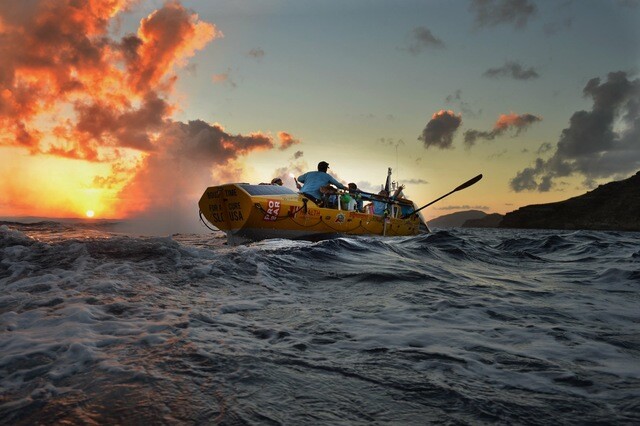
He continues: “The row changed me. . . . It really helped me understand what I already knew, that life is a gift and that it is the simple things in life that really make a difference: the beauty of the world, our family and friends, the gospel—those are the important things. If you strip away all of the noise and all of the distractions our modern world has to offer and when we get back to the simple basics of life, then we are happier, we are more at ease or at peace, and we are able to be closer to our Father in Heaven.”
When asked if he would do the row again, Alderman says, “In a heartbeat.” But Alderman also knows this isn’t the end of Row4ALS. The team attracted international coverage during their journey, and Alderman knows, “There are a lot of other oceans we need to row and a lot of activities we need to do, so we will continue to raise awareness and to raise money.”
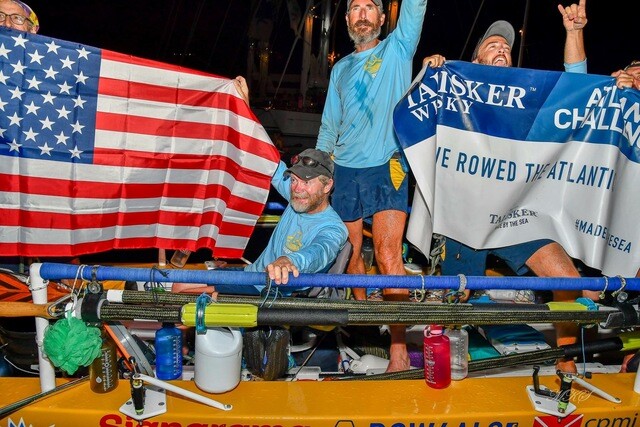
“[My faith] has been a journey,” Alderman acknowledges. “I think that as human beings we kind of ebb and flow. We have peaks and valleys in everything in life, even in our relationship with our Father in Heaven, and I am hoping and I believe that as we have one peak and then we go down into the next valley, that valley is not as low as the valley before it. Then we summit the next peak and it is a little bit higher than the one before. Then we continue until we finally reach and return to live with our Father in Heaven.”
The row contained both peaks and valleys as Alderman adjusted to the physical demands of the race. But through the process, he learned, “Most of what we do in life is just noise. We need to simplify and have a singularity of purpose in our lives, and when we achieve that, then we are at peace and our lives are happier and more fulfilling.”
Looking forward to the journeys that await him, Alan Alderman can honestly say, “I don't fear death, and I think that is because of the gospel and because of the testimony and the faith that I have. But until that happens, I am going to live. . . . I am going to have experiences with my Father in Heaven and my fellow humans, and that's what makes a life. It's not how long you live, but how you live.”

